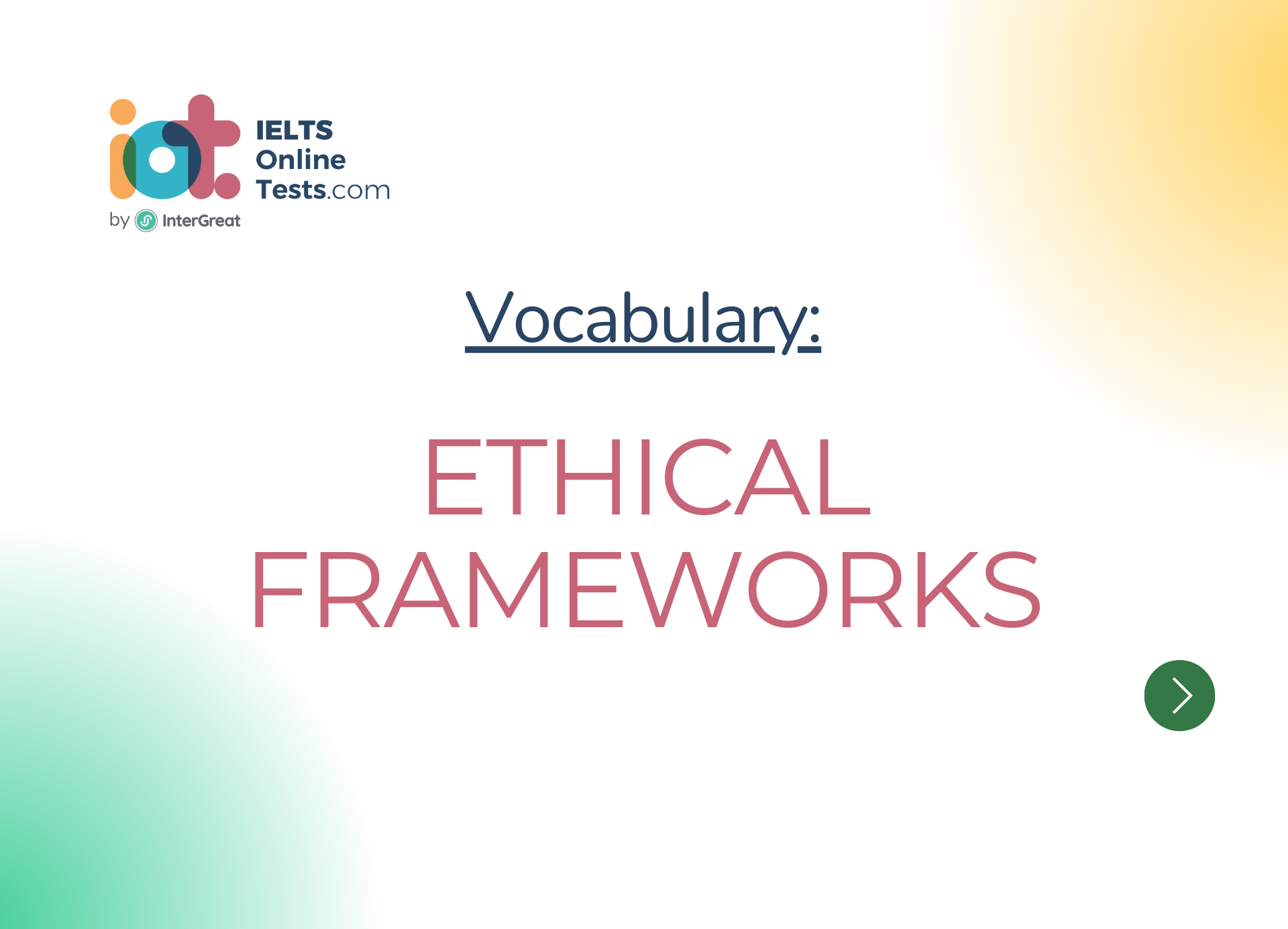
Ethical frameworks
Below is a detailed list of vocabulary related to "Ethical Frameworks" that can help you discuss different moral principles and systems of ethical reasoning in English, suitable for the IELTS band score range of 6.5-8.0:
Utilitarianism:
Definition: An ethical theory that suggests the right action is the one that maximizes overall happiness or utility for the greatest number of people.
Example: Utilitarians would consider the consequences of an action to determine its ethical value.
Deontology:
Definition: A moral framework that emphasizes the importance of adhering to universal moral principles and duties.
Example: Immanuel Kant's categorical imperative is a deontological principle that emphasizes acting in ways that could be universalized.
Virtue Ethics:
Definition: An ethical theory that focuses on cultivating virtuous character traits to guide moral decision-making.
Example: Aristotle's virtue ethics suggests that one should aim to develop virtues like courage, wisdom, and compassion.
Rights-based Ethics:
Definition: A moral framework that centers on protecting and respecting individuals' inherent rights and freedoms.
Example: Human rights are considered a fundamental aspect of rights-based ethics.
Justice Ethics:
Definition: An ethical theory that emphasizes fairness, equality, and impartiality in the distribution of benefits and burdens.
Example: John Rawls' theory of justice focuses on the principles of fairness and the original position.
Ethical Relativism:
Definition: The belief that ethical principles and values are relative and vary depending on cultural, social, or individual perspectives.
Example: Ethical relativists argue that moral judgments are culturally specific and not universally applicable.
Feminist Ethics:
Definition: An ethical approach that highlights the importance of gender equality and challenges traditional gender roles and biases.
Example: Feminist ethics critique the historical exclusion of women's perspectives in ethical theories.
Casuistry:
Definition: An ethical reasoning method that involves comparing a current ethical dilemma to past cases with similar features and outcomes.
Example: Casuistry can be helpful in resolving complex moral dilemmas by considering precedent cases.
Ethical Pluralism:
Definition: The view that there are multiple valid ethical principles or theories, and sometimes, they may conflict with each other.
Example: Ethical pluralists believe that no single ethical theory can address all moral issues comprehensively.
Consequentialism:
Definition: A family of ethical theories that evaluate actions based on their outcomes or consequences.
Example: Utilitarianism and ethical egoism are both forms of consequentialism.
Non-Consequentialism:
Definition: Ethical theories that focus on the inherent nature of actions or rules rather than their outcomes.
Example: Deontological theories, such as Kantian ethics, are non-consequentialist in nature.
Ethical Egoism:
Definition: An ethical theory that holds individuals should act in their own self-interest, maximizing their own well-being.
Example: Ethical egoists argue that pursuing one's self-interest can ultimately lead to overall societal benefit.
Altruism:
Definition: The belief in and practice of unselfish concern for the well-being of others.
Example: Altruistic individuals prioritize the needs of others above their own.
Integrity:
Definition: The quality of being honest, consistent, and adhering to moral principles and values.
Example: Acting with integrity means upholding ethical standards even in challenging situations.
Moral Dilemma:
Definition: A situation in which a person faces conflicting moral principles and must choose between two or more ethically challenging options.
Example: Deciding whether to tell the truth to protect someone's feelings or being honest in a difficult situation presents a moral dilemma.
By familiarizing yourself with these ethical frameworks and related vocabulary, you can engage in thoughtful discussions about morality and ethical decision-making, contributing to a higher band score in the IELTS exam. Good luck with your studies!




